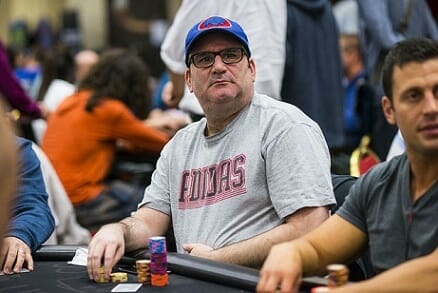Definition of a Slow Roll and why it’s a Big Breach of Poker Etiquette
By Steve Beauregard
A slow roll is perhaps the ugliest, most egregious breech of poker manners and etiquette possible. It’s a shameful display of unsportsmanlike behavior conducted by only the least likeable, most despicable, dumb and insecure human beings we have the unfortunate distinction of sharing space on this Earth with.
Have I been unclear?
The definition of slow rolling is multi-faceted, but basically it occurs at the showdown of a hand, when the winning player deliberately, and intentionally, turns his two cards over slowly, as a subtle way to “rub it in” the losing player’s face.

While perhaps making the slow roller feel good about himself for a minute or two, a slow roll is a mean act that creates a bad vibe at a poker table, making the game less fun for all involved.
Even poker players with less than stellar reputations when it comes to good manners despise the slow roll. No less than professional poker player Mike “The Mouth” Matusow has said, “It’s the most disgusting thing you could ever do. I’ve never slow rolled a person in my life. And I never will.”
Some experienced poker players consider a slow roll to occur only when the winning player is holding “the nuts,” or, the best hand possible.
Most other folks, however, consider it to be a slow roll whenever a player senses he has won, and pauses, or slows, the revealing process in order to milk his win. This is done to either showboat himself, or denigrate his opponent.
Ironically, it’s always the slow roller who ends up looking bad.
Traditional poker etiquette dictates that when the hand is over, you immediately flip your cards over if you feel you have won.
If you are holding the nuts, and you’re at the showdown portion of a hand, with nobody left to act, it’s important to flip the hand over as soon as possible.
If there has been a bet to you and you hold the nuts, it is acceptable to hem and haw or pause before calling or raising. This is often done in attempt to induce other players into the pot. It’s called “Hollywood’ing” which comes from the fact you know for sure you are going to be in the pot, you’re just putting on an act to try to get more action.
With only one other player in the pot however, an all-in bet to you or the “call” of your bet to your opponent is your signal to flip your cards over quickly. You know you’re going to hurt your opponent, so rip the band-aid off quickly.
But in most situations, you’ll have a good, but not necessarily a great hand. In situations where you’ve called a final bet, and are unsure where you stand in the hand, you’re allowed, as the “caller,” to hide your cards and see the bettor’s hand first. (Go here to see who shows their cards first in a poker game.)
If his or her hand has you beat, it’s OK to toss your cards into the muck. However if you have the bettor beat, it’s good sportsmanship to turn your winning hand over right away.
In cases where you’re new, (or in my case, had too many beers), and not sure if you’ve won, it’s acceptable to flip your cards over and “let the cards speak for themselves.” What this means is that you don’t have to say you’ve won or lost or anything. The dealer will look at your hand and the board, and determine whether or not you’ve won the pot.
There’s never an acceptable time to slow roll a fellow player, for as they say, “what comes around, goes around.”
No matter if there’s been a rude, obnoxious player slow rolling the table all night, it’s still not good poker behavior to slow roll him when given the opportunity. Always take the high road, no matter how hard it is to do sometimes. Don’t go down to the slow rollers level.
Our parents always used to tell us in school, “Don’t cheat on a test. You’re only hurting yourself.” Looking back on it it’s true, and is sound advice for the would-be slow roller. He or she may be trying to make an opponent look bad, but it’s the slow roller who comes across as the inexperienced donkey.
After all, a good poker player is used to winning pots, and doesn’t treat winning one pot as cause for a huge display of showmanship.
(Go here for a discussion on when it’s OK to leave the table during a poker game).
For as the great Green Bay Packer coach Vince Lombardi once said to a player reaching the end zone: “Act you’ve been there.”
(Photo courtesy of World Poker Tour).
